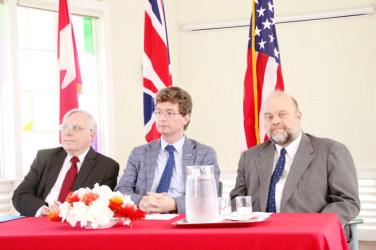Diplomats representing the American, British and Canadian (ABC) governments in Guyana said yesterday that low voter turnout was par for the course in Local Government Elections (LGE) the world over.
They maintained too that nothing was observed that would call into question the integrity and accuracy of the March 18 LGE, which were free, fair and transparent.
United States Ambassador Perry Holloway, British High Commissioner Greg Quinn and Canadian High Commissioner Pierre Giroux, at a press conference held at the Canadian High Commission reiterated the declaration they had made in a joint statement issued on Saturday.
Quinn said that while some problems did arise they were quickly identified and resolved in keeping with Guyana’s election laws thus the diplomatic team of observers has agreed that they were satisfied with the elections process.
Asked to comment on the low voter turnout the diplomats said that while the turnout was low it was characteristic of LGE around the world.
According to Holloway he has observed LGE in about 10 countries and that the turnout here was possibly the highest he has witnessed.
“Was it lower than general elections? Yes it was! But should you expect it to be the same, I would say no,” Holloway added.
Holloway was supported in his reasoning by the two other Heads of Missions who both concurred that local elections globally have been characterized by low voter turnout with the exception of where the law mandates citizens to vote in some countries.

Quinn said, “In the UK a 38% turnout at LGE is actually quite high.” It has since been confirmed that the voter turnout on Friday was 47.1%.
Asked where responsibility for voter turnout rests, the diplomats stressed that it was a collective responsibility.
“Everybody needs to get out. It is not just a question of one group being involved; everyone needs to be involved,” Quinn said.
“While we would have liked to see a higher turnout, it is completely understandable that in the absence of local elections for more than 22 years, there would be some anxiety, apprehension and uncertainty among some voters on what these elections were all about,” Holloway added.
The diplomats believe that as the people of Guyana become more familiar with the local government system and are able to understand the powers held by councillors they might respond more positively to LGE.
“What happens over the next three years will encourage voters to come out in 2019,” Quinn said, he added that Friday’s turnout was also possibly a reflection of the fact that persons “didn’t understand the process and why they should vote for a particular person. They didn’t know what the councillor can actually do for them.”
Holloway stated that close of polls on Friday represented the end of one election cycle and the beginning of another.
“In 2019 voters’ candidates and the general population will build on this experience and increase voter turnout. In the interim citizens will hold local government official accountable for their performance in their respective offices. If they do not perform, the people will speak again and new representative will be selected,” he said.
The diplomats also reiterated that as international observers they are not interested in who wins or loses rather their focus is and always has been on the process by which people are elected.
They expressed the hope that they will be able to continue enhancing the elections process both through new legislation that would address long-standing concerns on campaign finance, equal access to media and use of state resources as well as the introduction of electronic registration, voting and tabulating.





